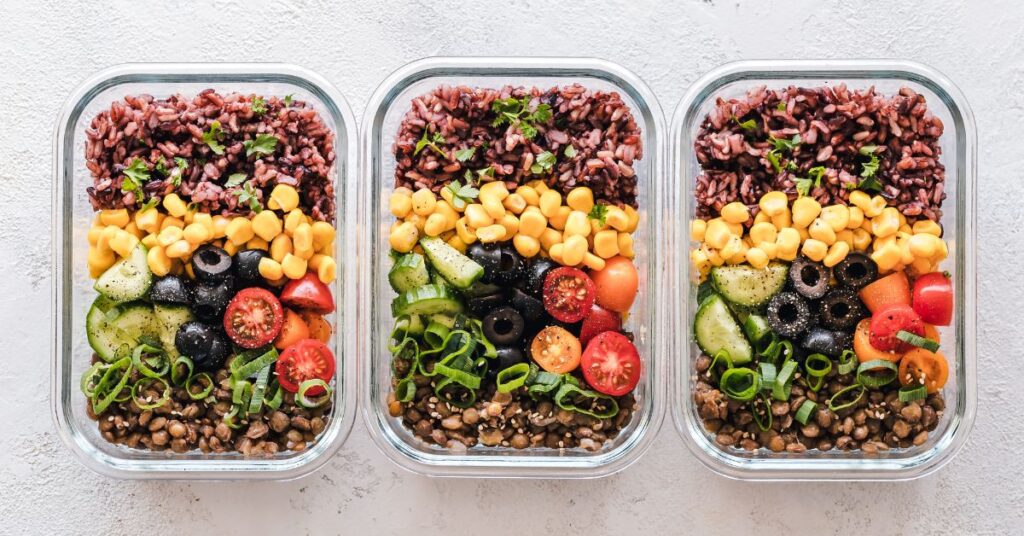
Managing menopausal weight gain with diet and meal planning
Menopause can be a difficult transition for many women, and one of the most common menopausal symptoms is weight gain. Meal planning is an effective strategy for managing menopausal weight changes, as it allows you to plan ahead and create healthy meals that are tailored to your individual needs (and taste buds!).
In this blog post, we’ll discuss why meal planning is so important during menopause and provide tips on how you can create a balanced meal plan that works for you through menopause and beyond. We’ll also cover what foods should be avoided during menopause and how to stay motivated with meal planning.

What is menopause?
Menopause is when your menstrual cycle pauses for good. It is a normal stage of life and not a disease that needs to be treated. The start of menopause is 12 months after your last period and typically starts on average, at age 51.
This change doesn’t happen overnight. There are usually a few transitional years sometimes called “perimenopause” that often start in your mid 40’s. This is when you may start feeling symptoms like hot flashes, night sweats and weight gain.
Once perimenopause finishes and menopause officially begins, your risk for heart disease and osteoporosis rise.
Why does this even happen? Some of the reasons behind all these changes include your changing hormones, metabolism, stress levels, and lifestyle. When your body goes through all these changes, its nutritional needs also change. Now let’s look at why we might be gaining during menopause.

Why do we gain weight during menopause?
Menopausal weight gain is caused by a decrease in the production of certain hormones, like estrogen. Estrogen helps to maintain a healthy metabolic rate and muscle mass, so when it drops, your body is more likely to store fat instead of burning it for energy. Additionally, lifestyle factors such as stress, lack of exercise or poor diet can all contribute to menopausal weight gain.
How changes in hormones affect your metabolism
Before we get into meal planning, let’s talk about how hormonal changes and estrogen levels affect your metabolism and can cause you to gain weight. During menopause, your body produces less of the hormones estrogen and progesterone. These changes are responsible for most of the menopause symptoms you may be having. When your body makes less estrogen and progesterone, your metabolism slows down, causing you to burn fewer calories throughout the day.
With less estrogen in your system, you may experience the following symptoms:
- Feeling tired
- Mood changes
- Night sweats
- Hot flashes
- Weight gain (especially around the midsection)
You may experience symptoms differently than others, so it’s important to listen to your body and make adjustments accordingly. Other symptoms that aren’t as common are changes in your sleeping patterns, dry skin, and increased risk of osteoporosis. For a more comprehensive list of menopause symptoms, the Cleveland Clinic has put together a helpful article that goes in depth on the changes you may experience during your menopausal transition.
If your doctor has prescribed hormone replacement supplements or hormone therapy, you may want to schedule an appointment to discuss your hormone levels and see if you need additional support. The North American Menopause Society is a great resource to learn more about the benefits of hormone therapy and how to choose a treatment plan that is right for you.
While a prescription to manage your hormone levels and hormonal changes isn’t always the answer to weight gain and other menopausal symptoms, some women find that hormone replacement therapy helps.

Can I lose weight during menopause?
Gaining weight can be a part of menopause, but that doesn’t mean weight loss is impossible. You don’t have to gain weight during menopause at all! The key is to focus on making small changes over time to gradually shift your lifestyle and diet as you’re making this menopausal transition.
For a lot of women, menopause presents an excellent opportunity to create a fresh start with healthy eating habits. Meal planning ahead of time allows you to stay on track with your nutrition and health goals by ensuring that you always have nutritious meals and snacks ready when hunger strikes.
According to the National Institute of Health, most women not only experience weight gain, they also experience changes in the way fat cells are distributed in the body. For menopausal women, weight gain is often most significant in the abdominal area, so it’s important to focus on managing menopausal weight changes through a combination of diet and exercise.
The good news is, managing weight gain during menopause doesn’t have to mean drastic changes to your diet. You can still enjoy your favorite foods while making healthy swaps like whole grains, fresh produce, and lean proteins for processed foods and sugary snacks.

Identify lifestyle changes to help manage menopausal weight gain
One of the best ways to manage menopausal weight gain is by focusing on lifestyle changes. This can include things like regular exercise, getting enough sleep each night, and stress management.
Regular exercise has numerous benefits for menopausal women, including increased energy levels, improved mood, and better overall health. Try to aim for at least 30 minutes of moderate physical activity on most days of the week —even something as simple as a brisk walk or walking your dog can make a difference!
In addition to exercising regularly, it’s important to get plenty of restful sleep each night. During menopause, many women experience insomnia or difficulty sleeping at night. Try sticking to a consistent bedtime routine and keep your bedroom dark and cool, in addition to avoiding caffeine late in the day to help improve your quality of sleep.
Other lifestyle factors to consider include reducing stress and drinking plenty of water. Stress can cause you to crave unhealthy foods, while staying hydrated throughout the day can help control appetite and hunger levels.

After menopause, you are at a greater risk for certain health problems like osteoporosis and heart disease, so it’s important to make sure you have a diet to help support you during these changes. While gaining weight is one of the more obvious changes in your body once you’ve reached menopause, there are many other unseen changes happening as well. Taking care of your physical (and mental) health is the best way to ensure menopause is just a minor transition in your life.
The importance of meal planning for menopausal women
In addition to lifestyle changes, meal planning can help you stay focused on your health and nutrition while your body is going through this transition. Meal planning is essential for menopausal weight gain, as it allows you to plan ahead and create healthy meals that are tailored to your individual needs (and taste buds!).
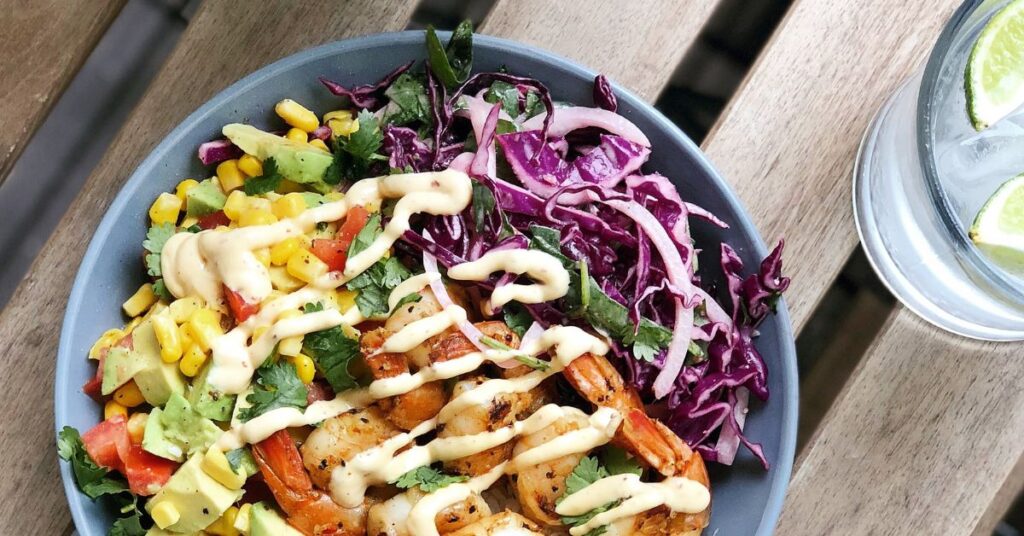
Feed your body during menopause
Meal planning also helps you make sure you’re getting all the right nutrients. Since menopausal women tend to have higher needs for certain vitamins and minerals, such as calcium, iron, and B vitamins, meal planning can help make sure you’re getting the nutrition your body needs.
Consider doing the following:
Eat higher quality foods
Since you may need to adjust the amount of food you eat after menopause in order to help manage your weight, it’s still really important to eat quality foods with a lot of nutrients (i.e., nutrient-dense foods). These include fruits, vegetables, and whole grains. When it comes to protein for your muscles and bones, eat legumes, nuts, seeds, fish, and/or poultry.
A recent study showed that menopausal women who ate the most greens had the fewest complaints around typical menopausal symptoms like hot flashes.
By eating more nutrient-dense foods you will be getting more vitamins, minerals, fiber, and protein—all of which are very important to maintain your health now and beyond menopause.
Pro Tip: Your bones love calcium and vitamin D. Some of the richest sources of these are dairy products, fish with bones, and foods fortified with these nutrients (check your labels). Here is a recipe which you and your bones will love!
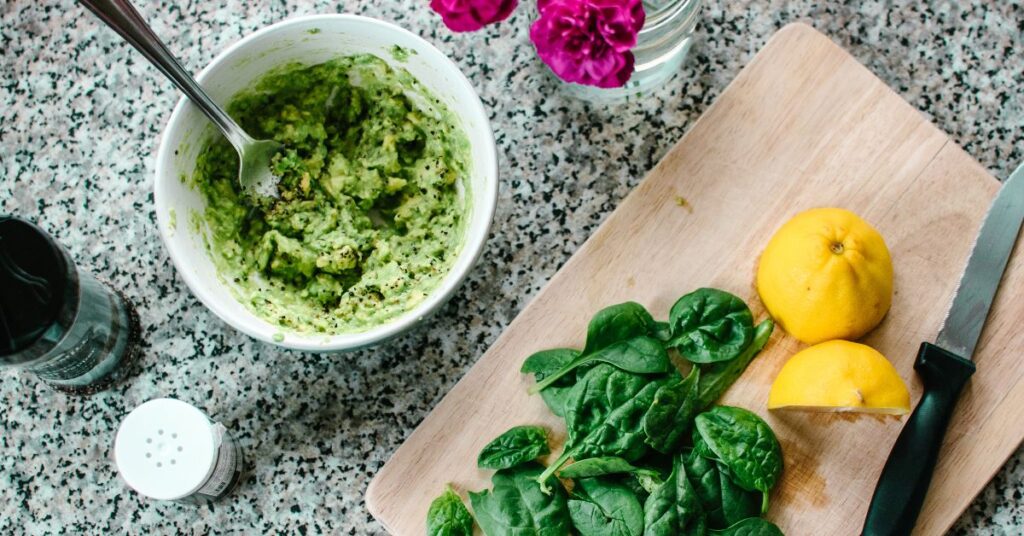
Drink enough fluids
As you age, you may slowly lose your sense of thirst. This means you can become less hydrated without even noticing it. Some key menopausal symptoms may also be improved simply by drinking more fluids. If hot flashes, night sweats, vaginal dryness, or bladder infections are affecting you, try drinking at least six 8 ounce glasses of non-caffeinated liquids per day to help hydrate you. Ideally, that drink is water or herbal tea.
Make your water more interesting by infusing it with fruits, citrus, or herbs. Oftentimes when we are feeling tired, a cool glass of water can help us feel more energized and alert.

What foods should I avoid during menopause?
While I don’t believe you should ever deprive yourself of any food, there are some foods you want to minimize from your diet during this period of your life. Like any other change, it’s easy to slip into old habits, so try to be mindful of what you’re eating.
Avoid processed and higher fat foods
In general, menopausal women should avoid foods high in saturated fat and sugar—such as red meat, butter, candy, pastries, and processed snacks. It’s also important to steer clear of processed meats (such as bacon, deli meats and sausages) due to their higher contents of sodium, nitrites and unhealthy fats. These foods are ultimately weight promoting with little or no nutritional value, so they should be consumed in smaller amounts during the week.

Avoid alcohol
Alcohol might not be the best beverage of choice when going through menopause. Alcohol can worsen hot flashes and make it harder to stay asleep. It can also increase your risk for disease or worsen many health conditions. Plus, it has nutrient-free calories that can contribute to weight gain.
Cut down on spicy foods, caffeine, and sugar
If hot flashes bother you, consider avoiding common triggers like spicy foods and caffeine. Try cutting back by drinking decaffeinated coffee or tea or even switching to green tea that has less caffeine. Also consider decreasing spicy foods by substituting other herbs and spices to add flavor to your dish.

If you feel sugar is an issue, the simplest way to cut down is to replace sugar-sweetened drinks with water or herbal tea. When it comes to dessert, try eating smaller portions or even half-sized desserts. A recent study showed that menopausal women who ate more sweets, fats, and snacks suffered from menopausal symptoms more than those who ate more fruits and vegetables. We’re talking hot flashes, night sweats, muscle and joint problems, and bladder issues were all worse for those who ate excessive sugar and sweets. Here is a recipe I love that satisfies your sweet tooth and provides some health benefits!
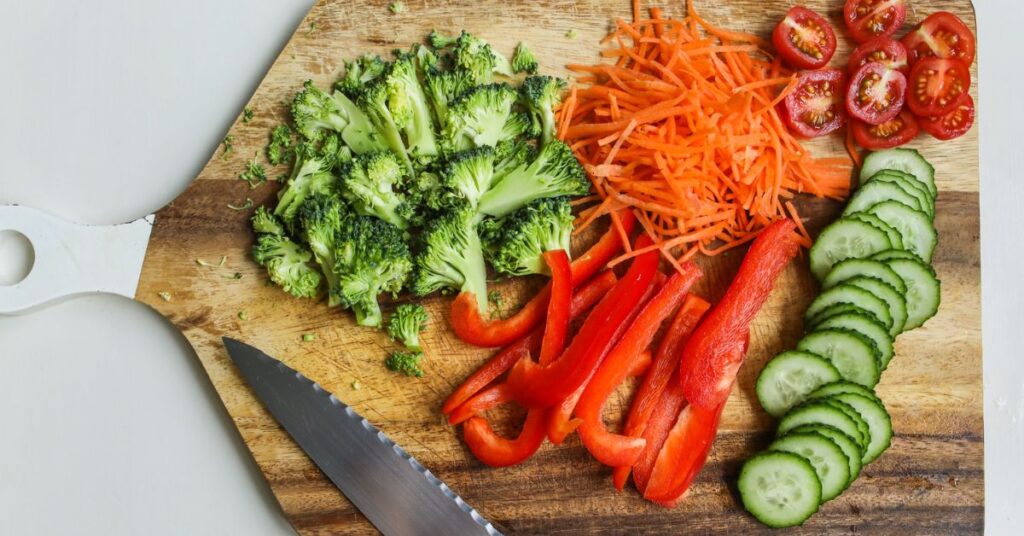
What is the best diet for menopausal weight gain in women?
While every woman is different and different people have different dietary needs, there are a few guidelines that work for most women.
- Unless you have dietary restrictions, you should be able to enjoy a balanced diet that includes lean proteins, fruits, vegetables, whole grains, legumes, nuts, and seeds.
- Fad diets, “detoxes”, and juice “cleanses” are not recommended for menopausal women—instead, focus on overall nutrition and health. Eating a variety of foods will ensure you get all the vitamins and minerals your body needs during menopause.
- One of my favorite eating plans is the Volumetrics Diet. The Volumetrics Diet focuses on foods that are lower in calories but high in nutrition. This type of diet is easy to follow and can help you manage menopausal weight gain without feeling hungry or deprived. This diet can help menopausal women avoid weight gain and maintain a healthy weight throughout the menopausal transition and beyond.
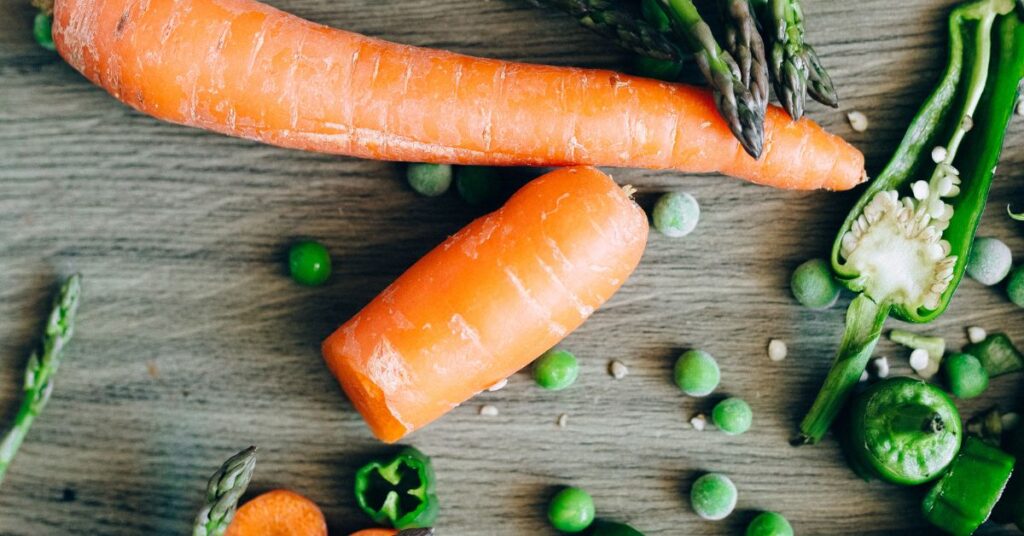
Meal planning tips for menopausal weight gain
1. Start with whole foods
As menopause affects your metabolism, start each meal off right by including plenty of nutrient-rich foods like vegetables, lean proteins, healthy fats and complex carbohydrates. Eating these types of foods will help nourish your body while also keeping hunger pangs at bay throughout the day.
2. Pay attention to portion sizes
Keeping portion sizes under control is an important part of managing menopausal weight gain. Eating too much food can lead to weight gain, so make sure you’re not overeating when preparing meals or dining out. Use the MyPlate as a guide to help you start appropriately portioning out different food groups on your plate.
3. Set time aside for meal planning
Don’t underestimate the importance of planning your meals and snacks ahead of time! By taking the time to plan out your meals, you can ensure that all your dietary needs are being met while still having enough energy for the day’s activities. By making meal planning and prepping a regular part of your weekly routine, you are creating a new habit that will help you manage menopausal weight changes in the long run.
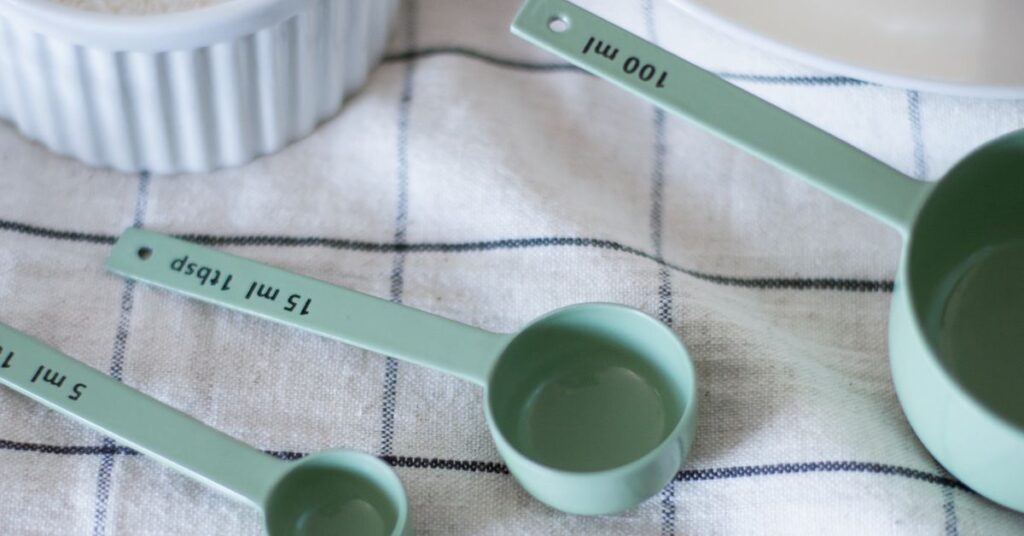
Practical tips for meal prepping
To save time in the kitchen, take advantage of meal prepping by preparing several meals in one day. Additionally, make use of slow cookers and pressure cookers to create healthy meals quickly and easily.
Decide on a day of the week to do your meal prep. For me, that day is usually Sunday. Start by taking inventory of your refrigerator and pantry. Then pick out one, two or three recipes you want to make for the week. Make a list of the ingredients you will need to buy based on what you already have on hand and plan out your meals for the week.
Next, decide how many meals you want to make ahead of time and shop accordingly. To save money and reduce waste, try to buy items that can be used in multiple recipes throughout the week.
Once you’ve completed your shopping trip and returned home with all your ingredients ready to go, it’s time to get cooking! If possible, start prepping several ingredients at once such as chopping vegetables or washing and drying items. This will help you save time in the long run.
Finally, when your meals are ready to be stored, make sure you use airtight containers so that food doesn’t lose its freshness. Label each container with the date it was prepared as well as a brief description of the meal inside.
For a more in-depth look at how to integrate meal planning into your daily and weekly routine, click here to read my blog post on easy meal prep ideas.

Shop smarter when grocery shopping
Grocery shopping is an important part of menopausal weight management. By taking the time to plan ahead and shop smarter, you can save money while stocking up on nutritious food items.
Here are some tips to get you started:
- Make a list before you go to the store and stick to it. This will ensure that you don’t overspend or buy things that you don’t need.
- Try to buy seasonal produce whenever possible as these items tend to cost less than out-of-season fruits and veggies.
- Take advantage of bulk bins for buying staples such as grains, nuts, seeds, and legumes in bulk amounts which is usually cheaper than pre-packaged items.
- Don’t be tempted by junk food and processed snacks. If your grocery store has a sale on these snacks, it’s best to just stay away from those items altogether.
- Try buying store brands or generic versions of products to save money without sacrificing nutrition.
Stay motivated with meal planning and prepping
Just like anything else, meal planning and prepping is fun and exciting at first but can start to feel boring in the long run. To stay motivated, remember why you began meal planning in the first place and focus on the benefits that come with it. Over time, you may find it almost therapeutic. It’s a quiet time of self-care and planning that can be a great stress reliever. And let’s not forget the money-saving aspect! Meal planning saves you time, money, and energy—all of which are precious commodities during menopause.
You could also use your meal prep time to put on a good audiobook, listen to a podcast, or watch some YouTube videos. If your family wants to join in the fun, why not get the kids to help out by adding ingredients or stirring the pot? Meal prepping can be an enjoyable opportunity to spend time with your family in the kitchen.

Reaping the rewards: Lose weight during menopause
Menopause doesn’t have to mean drastic changes in your diet. With a few lifestyle and dietary tweaks, you can maintain your weight and improve your overall health. Meal planning and prepping is essential for menopausal weight management, so be sure to create nutritious meals that are tailored to your individual needs.
At the end of the day, when you dedicate time to meal planning and grocery shopping, you reap the rewards in terms of weight loss. So get creative in the kitchen, shop smarter, and don’t forget to have fun with it! Meal planning doesn’t have to be a chore—it can be an exciting opportunity for you to try new recipes and give your body nourishing foods and improve your overall health.

Your next steps for managing menopausal weight gain
If you are looking to take control of your weight but need additional support, reach out to me. You can book a complimentary call with me here. I offer personalized nutrition programs to meet the unique needs of menopausal women and can provide you with valuable insight on your health journey.





